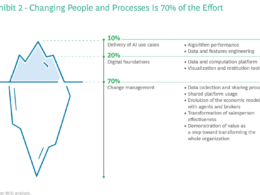health transformation institute (HTI)
the most comprehensive knowledge portal, for health transformation
Joaquim Cardoso MSc*
Founder, Chief Researcher and Editor
November 28, 2022
MSc* from London Business School — MIT Sloan Masters Program
This is a republication of the Executive Summary of the report below, with the title above, edited by the Chief Editor of the portal
Health & AI — Now and Next
Damien Gromier, Charlotte Pierron Perlès, Stéphanie Trang, Barnabé Lecouteux
November 2022
Executive Summary
As part of the “AI for Health Global Conference”, held on November 16, 2022, this report gathers a large panel of 140+ respondents into an online survey, along with 22 deep-dive interviews with field change makers that bring their expertise in the domain.
1.First, we notice a continuity of the trends observed back in 2021.
Data and AI are still considered as key by organizations, although employee acculturation is lagging behind.
While dedicated units to address the matter are being deployed, they are still too far away from decision to drive the necessary impact.
Offering the best patient care in terms of outcome and journey remains the top priority especially for Hospitals.
Resource-wise, data scientists and data engineers are still the most requested profiles on the marketplace.
On maturity, the overall perception of the panel remains a feeling of a medium maturity level.
Data availability — data not always complete nor made accessible — and data quality — data not perceived reliable enough — still prevail as the key barriers for use cases industrialization.
Organizations are still on their way towards more robust data foundations. Data transformation and most importantly data interoperability …
… (in and out) especially when working in ecosystem, show great room for improvement.
Data visualization and machine / deep learning are still the most commonly used processing techniques.
Quantum technology, although booming in terms of hype especially for drug discovery, is still in its infancy.
When it comes to ethics and privacy, privacy can now be considered as an area where stakeholders master the regulatory space and systematically address it.
2.At the same time, new trends are emerging this year.
The remit of data and AI organizations in healthcare clearly focuses on mastering the roadmap and more and more managing the collection, qualification and prioritization of use cases.
Ecosystem plays have always been game-changing in the sector to create value, and they now accelerate with Startups and Hospitals at the forefront.
As maturity for data profiles’ need evolves, organizations know how to split core vs non core resources, that they would tend to externalize.
If maturity flattens, the commitment taken on industrialization for the years to come show a great level of ambition.
We can be confident in this ambition materializing, since more and more use cases are on in the pipelines.
As more stakeholders are engaged in those use cases, it can go with a difficulty to engage the business.
As for technical arbitration, we observe a progressive move to cloud from players beyond Startups, for whom this shift has always been a no brainer.
Hospitals and Research organizations are clearly accelerating there while Pharmas and MedTechs, that are more advanced, pursue their journey. We introduced this year the topic of sustainability in the discussion: although not considered central (yet), the dimension is gaining importance in decision-making.
As for ethics and privacy, the panel echoes the call for greater model explainability especially for Hospitals and Research organizations.
Finally, data sovereignty stands out as a growing concern in choices, reinforced by the context of growing political instability.
We propose a maturity pattern in this year barometer, where we address the “how to reach the next stage” question.
For large organizations, improving employee acculturation and infusing innovation outside-in seem to be the most impactful levers.
Also, moving from the medium state (“transitional”) to the most advanced one (“experienced”) would be easier for Startups than for others, which can be a great source of inspiration for large organizations.
When taking the different panel stakeholders one by one, we notice that they will now very much concentrate on their core capabilities in their effort to develop and scale data and AI use cases:
- Pharmas/MedTechs focus their efforts on big data drug discovery and on cracking the code of efficient developments to hit the market faster, cheaper and with more sucess;
- Hospitals & clinics are still very much into improving care organizations inside their walls and more and more into managing their transition to care out of the hospital, especially for chronic disease management;
- Research organizations become more and more open to their ecosystem and are mixing fundamental and applied research, hence getting closer to value for the end users;
- Startups would address big Pharmas/MedTechs and Hospitals as their main clients with SaaS models. They tend to internalize the full data process lifecycle, especially when it comes to cutting edge data science;
- Insurance, also not statistically represented in this panel, favor marketing & sales and services for their clients.
Beyond the buzzwords, we wanted to emphasize a couple of hot dimensions that we believe are central to how the AI for health ecosystem evolves:
- Patient centricity is a concept that has been around for years. Not only that stakeholders now do have a better understanding of what patients — really — want in their diversity, but they also feel better equipped to address their needs;
- Care systems are being impacted by data and AI, and hence progressively introducing shifts. Use cases are growing in Hospitals around care delivery and care efficiency improvements, and outside of Hospitals with care coordination. The focus is on techniques that are the most mature (data visualization, Machine Learning);
- Startups, Big Pharmas and Research organizations are reshaping the panorama of R&D. While in Research, we see more and more in silico approach to down-select the most promising drug candidates, sometimes leveraging Quantum, the race for a more efficient Drug development generates excitement around revisited processes, new data sources and value adding use cases addressing patient and practitioners pain points;
- After COVID, there will be no going back to the old model of regular visit to the practitioners with limited differentiation. Content, channel, timing and frequency should fit into the doctor’s agenda, leveraging techniques that are used in more mature industries to shape the next generation engagement model;
- Connected health, defined as the way to harness the power of new technology to improve patient engagement and health outcomes is a play where Pharmas, MedTechs and Startups have heavily invested over the years and still have a way to go before getting value in return;
- Building a solid data foundation, no matter the origin and type of data, is a necessary condition to unleash the power of healthcare data. If all players recognize that the matter is key, they also acknowledge that they are mid-way, with most of them already having a tech platform, that now needs to be fed with quality data serviced as-a-product, at the intersection of data, IT and business;
- With data and AI entering in healthcare, we are dealing with an in-depth cultural change, that will not happen overnight. Many organizations are developing their own acculturation initiatives to develop the data and AI literacy of their resources in formats that are appealing. AI goes far beyond technical considerations;
- All of the above cannot fully materialize without the full support of the authorities that regulate products (e.g: drugs, devices), services (e.g: software, care intervention) and process (e.g: consent management, algorithm re-training) delivery and pricing. There is an overall call for simplification and co-construction so that regulation can be more supportive of the innovation effort of the whole industry.
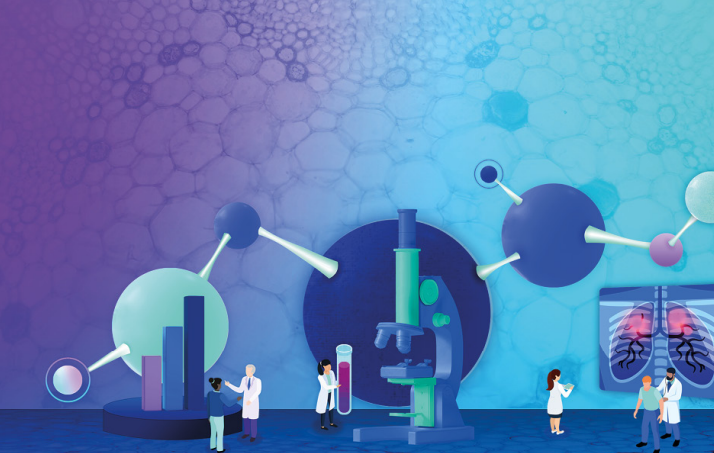
Executive Summary by Section
I.AI Strategy & Operating Model
1.Level of executive engagement & acculturation
- In continuity with 2021 and reinforced by COVID 19, AI is still considered a key top topic by organizations (3.1/4).
- However, the level of acculturation of C-level executives is lagging, especially for organizations that would need it the most, i.e., Pharmas/ MedTechs and Hospital.
2.AI leadership
- In this dimension, we do not see major progress from 2021.
- Two thirds of players have put a Data and AI organization in place, one positioned at C-level but still away from Exco. Those departments, when existing, will oversee the data and AI roadmap.
- They are also increasingly responsible for demand management process, i.e., the process of collecting, qualifying, and prioritizing the use cases.
3.Business priorities
- Enhancing the Patient Care pathway and improving Care delivery remain on the top of the organizations’ agenda.
- In particular, this is a priority for Hospitals and Research organizations.
- Despite patients becoming more mature on their access to qualitative medical information, patient information has a priority by only one third of the panel.
4.Partnerships and open innovation
- Collaboration between actors is very frequent.
- Two-third of the panel say they rely at least sometimes on partnerships to deliver Data and AI use cases.
- Collaborations are split between business (Academics going slightly down, Startups going up) and technical collaboration (Technology, IT & less frequently data).
- When adopting open innovation frameworks, Startups and Hospitals are the ones that contribute the most to the construction of the ecosystem
5.Focus on Startups
- As the main clients, big private companies (Pharmas/MedTechs) and Hospitals come first.
- The subscription business model represents half of the panel, Pay-as-you go comes second and freemium went up by a factor of five from 2021.
- When selling digital products, Software as a Service (SaaS) is still the main mode, but PaaS (Platform as a Service) is catching up.
6.Data profiles
- In line with 2020 and 2021, data scientists and data engineers are still positioned as the two must-have profiles across all organizations.
- We see a shift in large organizations’ externalization of more commoditized and non-core data profiles.
- As for Startups, they tend to integrate the full data management process in-house as their core differentiator.
- In particular, they need high profile data scientists that are knowledgeable in both the domain (biology, patient journey management, et cetera) and the techniques (Machine Learning, NLP, quantum, and so on).
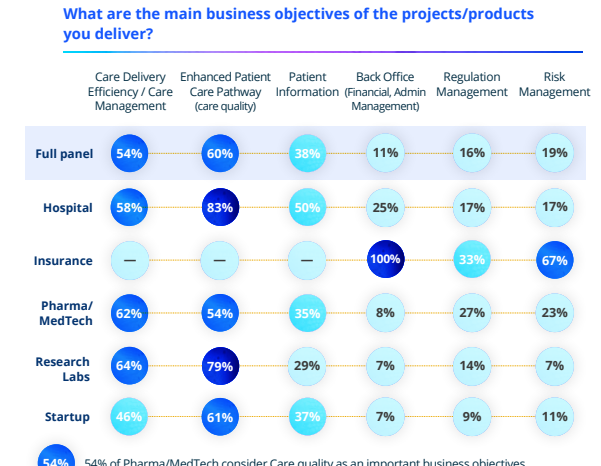
II.AI Maturity and Use Cases
1.Industrialization of Use Cases
- The overall perception is of medium maturity, in line with results from last year (2.7 in 2021 versus 2.8 in 2021).
- Similarly, companies expect to industrialize more use cases in the next 3 years than they did in 2021, which may happen soon, since more use cases are now on the table.
- Small companies are less confident in their capacity to scale up.
2.Maturity patterns
- We have designed a set of criteria to define learners, transitional and experienced organizations.
- To progress from one maturity state to another, learners and transitionals that are not Startups could focus on areas where a leapfrog is a synonym of increased maturity (acculturation and work in ecosystem).
- They also can take some inspiration from Startups
3.Use cases of interest
- Pharmas/MedTechs, and Research labs are concentrating their efforts on R&D: drug and device development (53%) and drug discovery (46%).
- Hospitals are mainly focused on optimized care organization (78%).
- Insurances mainly work around Marketing and sales (78%) and customer services (67%).
4.Barriers to use case development
- Companies in the sector recognize data accessibility and quality as the main barriers, with an emphasis on the reliability and completeness of datasets they handle.
- Other barriers are becoming increasingly important, such as the ability to engage business stakeholders or to adopt AI-enabled solutions.
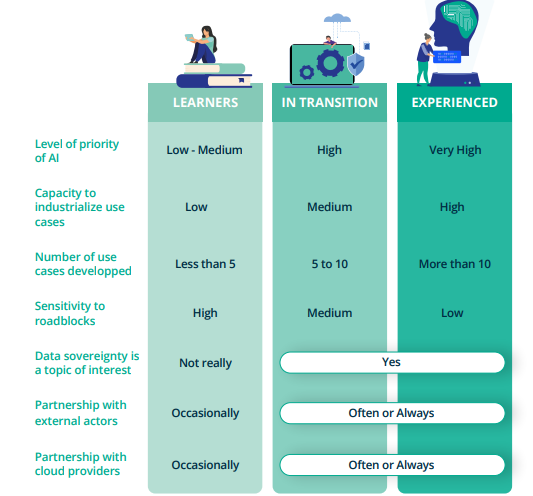
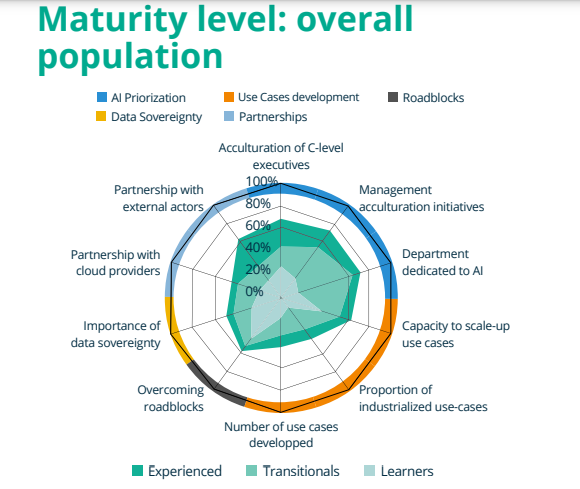
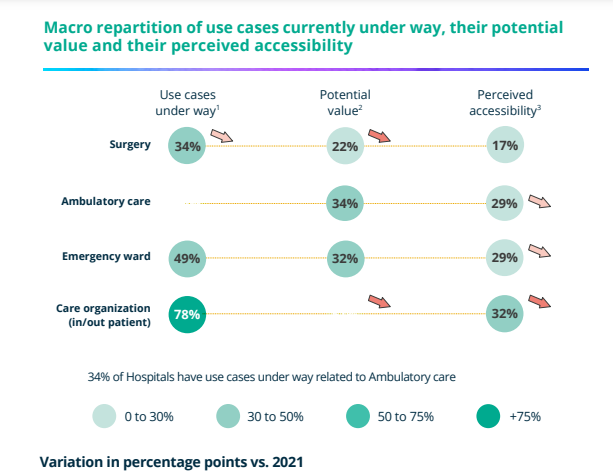
III.Technological Choices
1.Maturity in the data lifecycle
- Companies are quite confident on their capacity to build efficient data foundations across the data lifecycle.
- However, they are struggling with data interoperability which hinders data sharing initiatives both within organizations and between them.
2.Move to Cloud
- Healthcare is progressively moving to Cloud.
- For Startups, this is a no brainer.
- For Pharmas/Medtechs, it’s a transition.
- Hospitals and Research labs are clearly accelerating in their cloud agenda.
- AWS seems to be the most popular cloud provider in the healthcare sector, followed by Azure and GCP.
3.Data processing techniques
- Data visualization and Machine/Deep Learning are the most commonly used tools.
- Yet immature techniques (quantum computing, reinforcement learning) and more surprisingly mature ones (robotic process automation) present room for greater leverage.
Data visualization and Machine/Deep Learning are the most commonly used tools.
Yet immature techniques (quantum computing, reinforcement learning) and more surprisingly mature ones (robotic process automation) present room for greater leverage.
4.Sustainability
- Sustainability is an important criterion for making technological choices although not considered critical (yet).
- Some organization types such as Hospitals and Startups consider it to be less critical than others likely due to other priorities such as building and scaling their use cases.
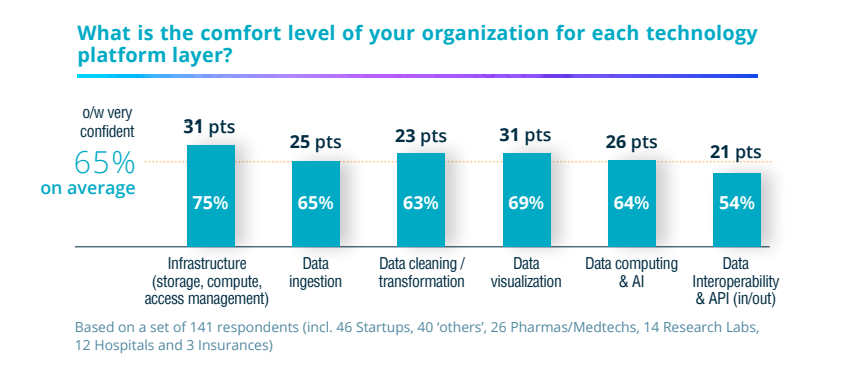
IV.Ethics & Privacy
1.Ethics and privacy: a challenge?
- Ethics related roadblocks are considered impactful by most organizations across the panel, but less so than privacy, although processes to master this challenges seem well in place, as regulation is now mature.
- Other ethics-related topics are also considered by organizations such as explainability (esp. for Research labs), fairness (esp. for Pharmas/ MedTechs as trainers of models) and to a lesser extent accountability (esp. Hospital in front the line of diagnosis and follow-up).
2.How are ethics and privacy tackled?
- All of the ethics & privacy related topics are analyzed during projects by most organizations. They are not systematically considered though.
- Among those considerations, privacy is almost consistently analyzed. This is probably because it is a topic with significant exposure to media and public opinion in general.
- So is data sovereignty with a growing concern of the stakeholders of what is at stake with health data.
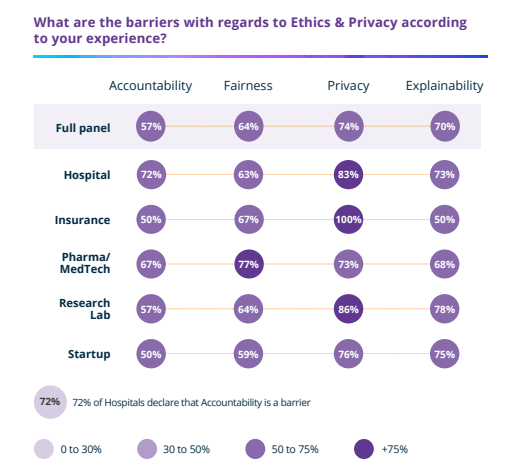

Study Objectives
Artificial Intelligence (AI) is defined as the attempt to replicate human cognitive capabilities through advanced technology, and to reach goals in an autonomous way by considering the constraints and obstacles of the environment.
Healthcare is defined as the improvement of health via prevention, diagnosis, treatment, amelioration or cure of disease, illness, injury, and other physical and mental impairments in people.
AI for Health refers here to data and AI issues aiming to transform the healthcare sector through the development and the deployment of use cases. Therefore, not only does this study comprises AI use cases, but it also considers the underlying data lifecycle (ingestion, storage, transformation, activation) together with data governance to be put in place.
As for our 2021 edition, the aim of this book is to provide a system-wide view of how data and AI are being used today in the healthcare sector at large. It also highlights opportunities for greater use and barriers to further adoption.
The following key items of AI development in healthcare are covered:
- AI strategy and operating model
- AI maturity and use cases
- Technological choices
- Ethics and privacy
It also encompasses key players involved in the development of AI for Health:
· Pharma and MedTech companies
· Tech providers
· Startups
· Insurance companies
· Hospitals
· Research labs
· Patients
· Regulators
This third edition of AI for Health also provides additional deep-dives on hot topics of interest in the field.
In the next concluding edition, we pivot to compare like for like insights with those gathered last year.
Methodology
Themes
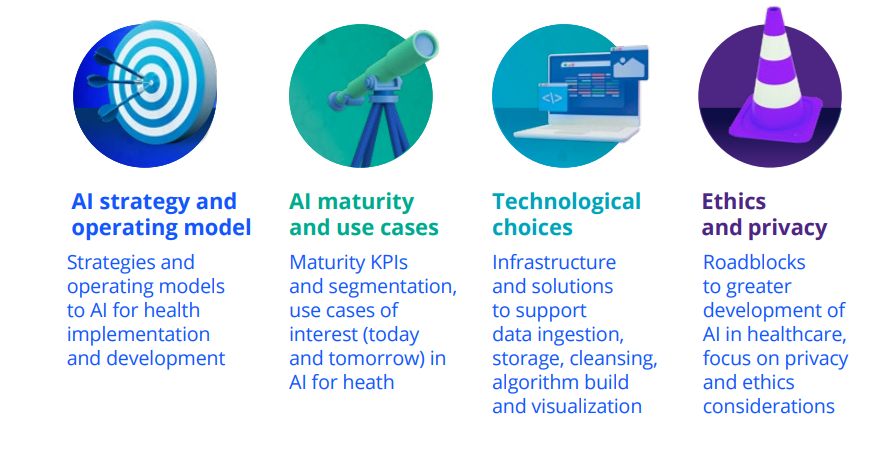
Method
Quantitative online survey with 141 respondents
1-hour interviews with 22 key opinion leaders & doers from the AI for Health ecosystem
Interviewee profiles
· CEO
· Head of Innovation
· Head of Research labs/ecosystems
· Head of Data / Data Science department
· Clinical Operations leaders
· Head of Digital health
Focus Area:
The healthcare ecosystem is moving fast, and in particular some topics on which we decided to focus on in this edition.
We do not intend to be exhaustive here, but rather to put the spotlight on some key topics, since we believe that this is where the future of data-driven healthcare is taking place.
Who better than field experts and doers in the field can take the mic? Read on to learn more.
Patient centricity: getting there?
- What are the actions taken to greater patient centricity and the challenges and barriers faced when doing so?
- What are the patient key needs and expectations?
- Any evolution to anticipate in patient needs?
Next Healthcare system paradigm
- What is the perception on hospital care delivery transformed by data and AI today?
- What are the perceived challenges in the paradigm shift of healthcare towards more digital innovation?
- What are the initiatives that leverage data and AI to manage healthcare at a broader level?
- What are the main AI techniques currently used?
Future of R&D
- What are the key ongoing data driven R&D initiatives?
- What are the main challenges/ barriers encountered when implementing?
- What are the data types that are mostly leverage?
- Which future for clinical trials in the coming 5 years?
Next generation engagement
- What has COVID changed in the way private actors interact with practitioners?
- How are contents and channels managed?
Connected health
- Where do we stand on digital health?
- How does digital health support therapies?
- Where do we stand in terms of digital therapeutics (DTx)?
Data foundations
- How important are data foundations to organizations’ strategy?
- What are the main data domains organizations are dealing with?
- What are the challenges and barriers encountered when developing a data foundations?
- What are the upcoming trends?
AI/Data acculturation & training
- How critical is AI and data acculturation and training to organizations?
- What are the initiatives deployed and the challenged faced when implementing AI and data culture?
- What trends are anticipated in the field?
Regulator’s viewpoint
- Which regulations are at stake?
- What are the main challenges/ barriers encountered when applying them?
- How will the role of the Regulator evolve in the coming years?
Study panel
This study is based on insights provided by 141 respondents to an open online survey, together with deep-dive discussions conducted together with 22 one-to-one interviews.
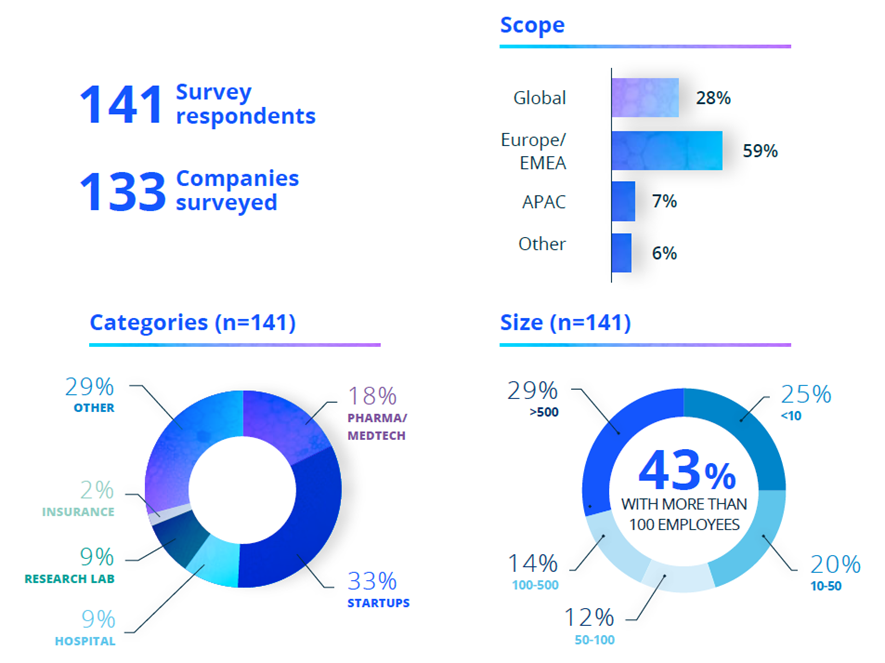
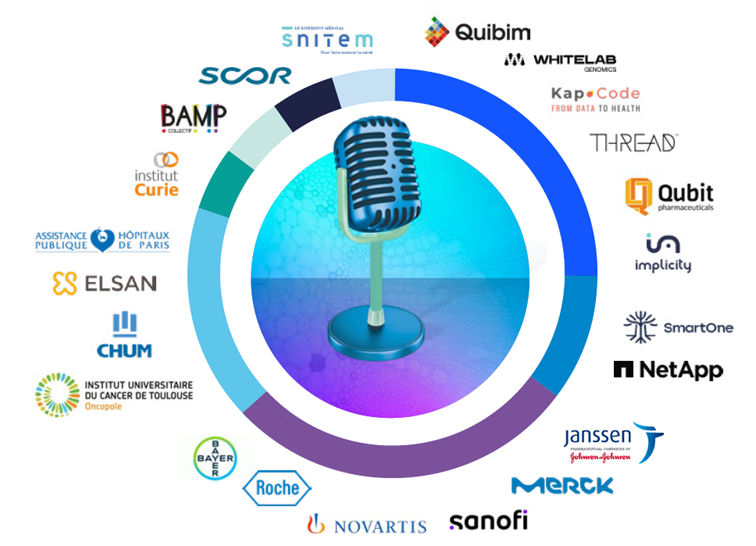
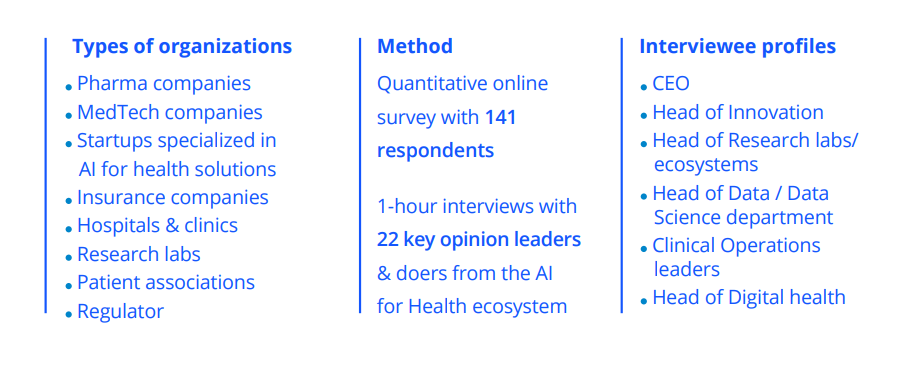
Foreword
Since 2016, tech leaders are developing their collaborations with healthcare institutions: Google launched 12 projects, Microsoft 7 and Amazon 5.
More recently, COVID paved the way for a massive interest in data and AI domain, stakeholders are now fully embracing it, learning and sometimes succeeding on their way.
Since 2016, tech leaders are developing their collaborations with healthcare institutions: Google launched 12 projects, Microsoft 7 and Amazon 5.
More recently, COVID paved the way for a massive interest in data and AI domain, stakeholders are now fully embracing it, learning and sometimes succeeding on their way.
In 2022, we are celebrating the 5th edition of the AI for Health Summit. 5-years is quite young, but old enough to see changes in this fast-evolving industry that is catching up at such a speedy pace.
After the success of the two first editions, we come back this year even stronger to report on where healthcare organizations stand in their data and AI journey.
We have extended our scope and we now cover Pharmas, MedTechs, Tech providers, Startups, Hospitals, Research labs, Insurance, Patients and Regulators.
… we come back this year even stronger to report on where healthcare organizations stand in their data and AI journey.
As part of the “AI for Health Global Conference”, held on November 16, 2022, this report gathers a large panel of 140+ respondents into an online survey, along with 22 deep-dive interviews with field change makers that bring their expertise in the domain.
We have reached some statistical significance and international stature. We would like to thank our panel for their precious insights.
Similar to 2021, the ambition of this work is to help stakeholders get more familiar with data AI strategic stakes and main applications, get a grasp of the industry’s level of maturity, while providing them with insights on the main roadblocks, ethical considerations, and operating choices they may face in their journey to implement data and AI use cases.
This year, we also provide an “how to guide” to reach the next level of data and AI literacy depending on your profile.
We take away from this edition that healthcare stakeholders are mid-way in their data and AI journey, at the crossroads of their ambition. They are getting their hands dirty with concrete use case delivery, sometimes meeting success and often facing challenges.
We built this report as a reference but also as a mind shaker of this rich ecosystem, that works more and more all together around an overarching common goal: delivering the best possible care to individual patients in their diversity and to society as a whole, at an affordable and sustainable cost.
We reiterate our ambition to have this report fully leveraged to ensure patients, practitioners and authorities get the most out of the on-going revolution of data and AI in healthcare. More than ever, we are on a mission to democratize a topic that every player can have a role in, either coming from a business background, a technical background or simply as a citizen.
Make no mistake! The wind of change is now blowing everywhere across this industry.
Make no mistake! The wind of change is now blowing everywhere across this industry.
We hope you will enjoy reading and using this report as much as we appreciated working on it.
Join us in shaping the future of AI for Health!
The editors









